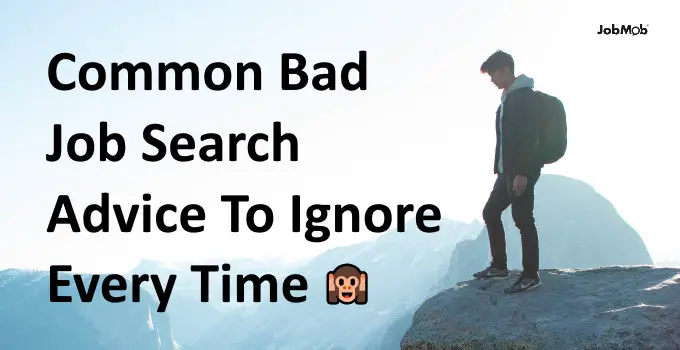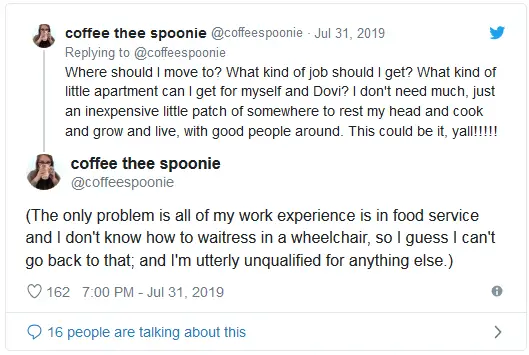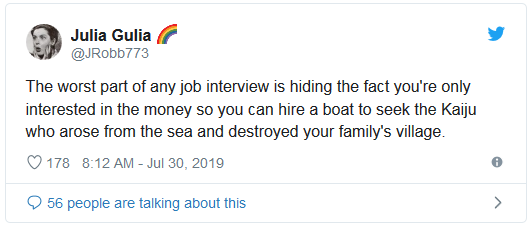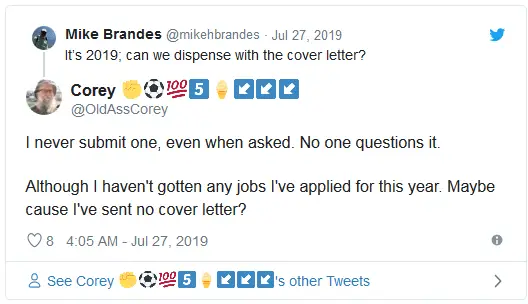Job search going poorly? Maybe you're following the wrong advice.

Everyone you ask – and some you don't – will have an opinion on what you need to do in your job search, and more so if your search is not going well, but some of that advice is just bad. After all, people thinking their advice is good doesn't make it good advice.
My favorite piece of bad job search advice is that job search is a numbers game, in that the more employers you apply to, the better your chances of finding a job. And then job seekers wonder why their job search is long…
Here are some other all-too-common pieces of bad job search advice you definitely shouldn't listen to.
15 Bad Job Hunting Tips and Advice
1. “Apply for everything online.”
Taking a non-targeted approach to your job search is unlikely to result in positive results.
Instead, spend your time targeting appropriate positions. The earlier you start targeting companies, the less jobs you'll need to apply for.
2. “Never apply for jobs online.”
For finding work, you don’t want to immediately cut out the massive resource that is the Internet just because there are some low-risk dangers involved in applying online.
While it is true that many people find their jobs through offline networking, it isn't the only strategy you should use.
You simply need to use the Internet more effectively, such as by measuring demand for your skills on the top job boards, and then using that information to decide where to apply.
3. “You want a job? Use the job site that just advertised on the Super Bowl.”
While Super Bowl job search commercials can be funny, those advertisers are trying to attract as many job seekers as possible.
Having more job seekers competing on their sites is great for them, but bad for you. If everyone is applying on the same job board, it is harder to get a response.
(This competition is actually a better reason to avoid applying on public job sites than the one given above.)
When it comes time to choose, focus on the niche, industry job boards and apply directly on company websites for better results.
4. “Include all of your work experience on your resume. You don’t want to come across as a liar.”
A resume is a marketing document whose purpose is to raise your value and make you more desirable to employers.
You don’t need to include every job you have ever had, especially if you've had many.
You need to include the most recent, relevant jobs you've had, while highlighting your achievements in each role.
5. “Use a functional resume as a first resort.”
In prioritizing your work successes and expertise over work history, a functional resume seems like a great idea especially if you have employment gaps or if you're making a major career transition.
In reality, recruiters get a whiff of a functional resume and immediately suspect you're trying to hide something with the less-used resume format.
Stick to a traditionally formatted resume with a reverse-chronological work history.
6. “Don’t waste time with small talk in job interviews. Just tell someone what you want immediately.”
If you are being a “me-first person” and just demanding what you want, people are unlikely to listen.
The best job interviewees take the opposite tack, making the interview “about them” (about the employer) as opposed to it being about you.
Why is the company hiring for this role? How can you help them fill those needs? Which problems need solving and how are you going to do it? And many other questions you can ask and use to impress in the interview.
7. “Take any job you can get.”
Just because a recruiter thinks you're right for the job doesn't mean it's right for you.
Taking the first job offer that comes your way in desperation is not only unlikely to lead to a job you love, it's much more likely to lead to a job you hate.
To come full circle, this is another reason why it's so important to properly do your job search research so that you only apply to companies you want to work for and will be happy to receive offers from.
What others are saying
8. “Tell them how much you need it”
No matter how true it may be, any inclination of desperation downgrades your appeal. Instead, focus on the skills and experience that make you a great fit for the job. Eagerness coveys emotion, and hiring managers prefer an employee who can keep cool under pressure.
9. “Do anything the recruiter asks you to do”
Liz Ryan's job search tips to ignore, over on Forbes:
When a recruiter asks for your salary history including proof of your past wages, give it to them immediately. Do anything the recruiter asks you to do — they are in charge, not you!
10. “Hit up people you barely know for introductions”
It’s one thing to ask a former colleague or boss to introduce you to someone over LinkedIn that they really, truly know. This can be low key and casual — “Hey, so and so, I thought it could be good to know James/Rita/Malcolm since they are in a similar area of…” This lets the third party give a polite non-communal response. Or, an enthusiastic, let’s talk more response.
But these days people are not limited to literal word of mouth connections. Unless this connector has a sincere relationship with this person, it’s likely to look like you forced them to reach out. Which, uh, you did.
11. “Tell your coworkers you’re looking for a new job. ”
Via Leah Arnold-Smeets on Payscale's blog:
Spreading the good word at your current employer about your active job search is probably not the smartest career move. Not only will the “good news” get back to the boss, but you’ll also find yourself without a job and without a reference.
12. “Don't bother looking for a job around the holidays.”
Reasoning: Hiring managers are too busy to look at your resume. They're preoccupied with year-end activities, reaching annual and quarterly quotas, writing performance reviews, and planning their own holidays.
My Advice: If they need someone to fill critical roles, especially if a quota is on the line, they just might hire someone like you – and quickly! Or, if they need someone to fill a new position that takes effect in January, it's a safe bet they'll be interviewing in November and December. Besides, if other job seekers heed this bad advice, there will be less competition for you.
I discussed this tip in 🎉 Should You Holiday From Job Hunting During The Holidays?
13. “No one reads cover letters anymore”
Via Sara McCord at the Muse:
There is no saving grace to this advice. I honestly don’t care if the person saying it is a hiring manager who never reads cover letters. I don’t care if it’s your BFF whose spouse is a hiring manager who never reads cover letters.
I’ve been in charge of reviewing applications too, and I always read—and carefully considered—an applicant’s cover letter. And as a Staff Writer/Editor at The Muse, I edit articles for people with a lot of experience in hiring, and more often than not, someone will read your cover letter.
And, so what if you do find that legendary hiring manager who doesn’t read your cover letter? That means you won’t get any points for your awesome work. OK, but you also don’t lose any points. But if you take this advice and meet a hiring manager—or anyone else at the company—who does read cover letters, you’re screwed.
14. “Wait to hear back”
Via Ashley Robinson on the Snag blog:
The last thing you want to do when job searching is stop. It will only slow down the process. Never stop applying until you have a job offer, even if you nailed the job interview.
15. “It's ok to apply for jobs you don't fully qualify for. You never know”
Via Alice D. Bianchi on the Freelancer blog:
People will tell you to apply for a job if you have some qualifications for it. This is the reason why you hear job seekers saying they have applied for several jobs but haven’t received a single invitation for interview. It is because they barely meet the requirements for the job. Don’t spend all day applying for jobs for which you are not qualified. Get engaged in other useful tasks that will add to your value. The number of high quality applications you send out is what matters most, not the number of semi-qualified applications.
Question of the article
What's the worst piece of bad job search advice you've ever been given? Why was it bad advice? Tell us in the comments.
About the Author
This article is based on a guest post by Lavie Margolin, with a special thank you to the following people for contributing their thoughts: Bruce H., Kathryn T., Richard W., Mary G., and Rose S.

An earlier version of this article was part of the The $10,000 7th Annual JobMob Guest Blogging Contest.
 |
WebHostingBuzz is a reliable web hosting company with the servers hosted at multiple US and Europe locations and over 30,000 happy customers worldwide. |
READ NEXT: Counterpoint: Don’t Bother Applying For Jobs Online.
Subscribe to JobMob via RSS or email and follow me on Twitter for more ways to save time & sweat on your job search.







Hi Lavie,
Thanks for turning bad advice into good advice! People get so worn down by their job search that it is so easy to listen to everyone and anyone…even people who have no idea.
I’m really impressed with how close you got to Bless’ score.
Pingback: The Dramatic End To The 7th Annual JobMob Guest Blogging Contest | JobMob
I almost enjoyed reading the above list but then wondered, Do some people make these things up just because the opposite is true and they have something to say. or has someone genuinely advised, “Use a functional resume as a first resort” or are we helping to sustain a myth?
I wish “functional resumes as a first resort” was good advice. Functional resumes make much more sense as a marketing format than reverse-chronological resumes, and if I was a recruiter, I’d prefer to know about someone as a complete package as opposed to what they’ve done lately. But I’m not a recruiter, and recruiters don’t usually think that way.
You can still find people recommending functional resumes in certain situations – I used to too – but the numbers show it’s not a good idea ultimately.
Pingback: The Dramatic End To The 7th Annual JobMob Guest Blogging Contest